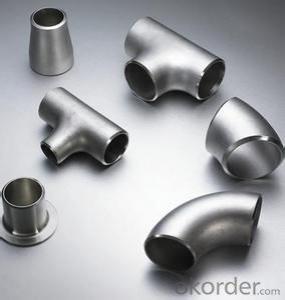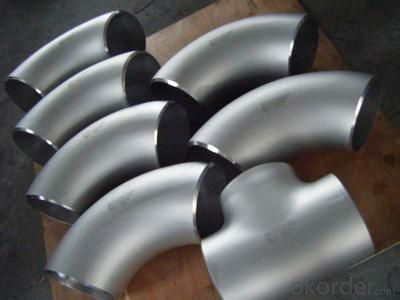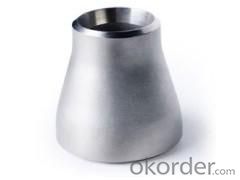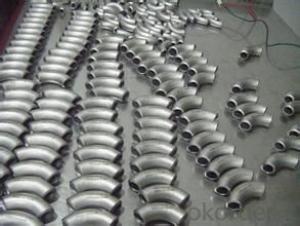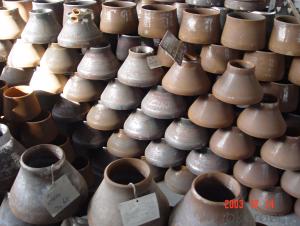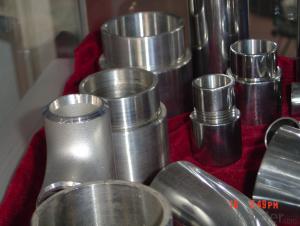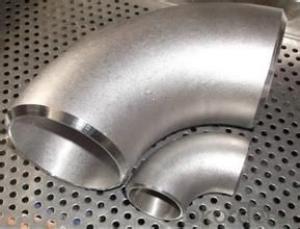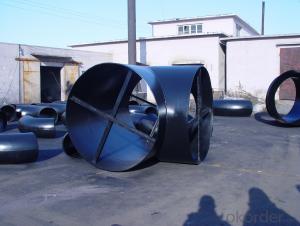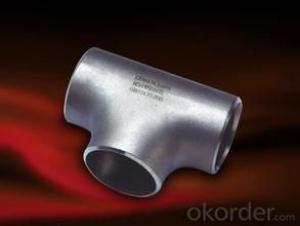STAINLESS STEEL PIPE BUTT WELDED 90D ELBOW LR 304L/316 ANSI B16.9
- Loading Port:
- Tianjin
- Payment Terms:
- TT OR LC
- Min Order Qty:
- 1 pc
- Supply Capability:
- 10000 pc/month
OKorder Service Pledge
OKorder Financial Service
You Might Also Like
Package Of Stainless Steel Butt-Welded Fitting:
PACKED IN PLYWOOD CASES OR PALLETS
Painting Of Stainless Steel Butt-Welded Fitting:
ANTI-RUST OIL
Marking Of Stainless Steel Butt-Welded Fitting:
REFER TO MARKING DOCUMENT or AS PER CUSTOMER REQUEST
Shipping Marks Of Stainless Steel Butt-Welded Fitting:
EACH WOODEN BOX TWO PLASTIC SHIPPING MARKS
Specification Of Stainless Steel Butt-Welded Fitting:
Stainless Steel 90Deg LR Elbow, Tee, Reducer and Cap
Size : 1/2"-48"
Wall Thickness.: SCH10-SCH160, SGP , XS, XXS, DIN ,STD
| Name | Stainless Steel Butt-Welded Fitting |
| Size | 1/2" - 48" |
| ANGLE | 45D 90 D 180D |
| Wall thickness | Sch5-Sch160 XXS,STD,XS, SGP |
| Standard | ASME B16.9, GOST 17375-2001, DIN2605 and JIS B2311, EN10253-1 etc. |
| We can also produce according to drawing and standards provided by customers. | |
| Material | 304, 304L, 316, 316L, 304/304L, 316/316L, EN1.4301, EN1.4404 etc. |
| Packaging | Wooden Cases, wooden pallet , or carton box , or nylog bag and then in wooden cases |
| Surface Treatment | Anti-rust Oil |
| Delivery Time | 20-30 days, after received advance payment. |
| Quality | 100% Heat Treatment, No Welding repair |
| Others | 1.Special design available according to your drawing. |
| 2.anti-corrosion and high-temperature resistant with black painting | |
| 3. All the production process are made under the ISO9001:2000 strictly. | |
| 4. A conformity rate of ex-factory inspection of products. | |
| 5. we have export right , offering FOB , CNF CIF price |
STANDARD & MATERIAL GRADE
STANDARD Of Carbon Steel Butt-Welded Fitting
| Standard | Wall Thickness | Type | |
| American Standard | ASME B16.9 | S5S ~ XXS | 45D, 90D, 180D ELBOW, TEE, REDUCER, CAP, STUB END |
| ASME B16.11 | |||
| ASME B16.28 | 90D SR ELBOW | ||
| Japanese Standard | JIS B2311 | SGP ~ LG |
MATERIAL Of Stainless Steel Flange
| Stainless Steel | ||
| Material Standard | Material Grade | |
| ASTM | ASTM A182 | F304 / F304 L |
| ASTM A182 | F316/ F316L | |
| ASTM A182 | F310, F321 | |
| ASTM A182 | F321 | |
| DIN EN | DIN EN 10222-5 | EN 1.4301 |
| DIN EN 10222-5 | EN 1.4404 | |
| JIS | JIS G3214 | SUS F304 |
| JIS G3214 | SUS F304L | |
| JIS G3214 | SUS F316 | |
| JIS G3214 | SUS F316L | |
- Q: What is the maximum allowable deflection for steel pipes?
- The maximum allowable deflection for steel pipes depends on various factors such as pipe diameter, wall thickness, material strength, and the intended application. It is typically determined by industry standards and specific engineering considerations.
- Q: Can steel pipes be used in extremely cold temperatures?
- Indeed, steel pipes are capable of being utilized in frigid temperatures. Renowned for its robustness and endurance, steel proves itself suitable for a plethora of applications, even in the most extreme wintry conditions. Steel pipes exhibit a remarkable resistance to low temperatures, withstanding the detrimental effects of freezing without compromising their structural integrity. Consequently, they prove to be ideal for deployment in industries such as oil and gas, where they encounter sub-zero environments. Moreover, the option to insulate or coat steel pipes further fortifies them against the cold, preemptively averting issues like freezing or cracking. In summary, steel pipes unquestionably represent a trustworthy choice for deployment in exceedingly cold temperatures.
- Q: How do steel pipes handle thermal expansion and contraction?
- The unique properties and design of steel pipes enable them to handle thermal expansion and contraction. When exposed to high temperatures, steel pipes expand as the molecules in the material gain energy and become more active. Conversely, when exposed to low temperatures, steel pipes contract as the molecules lose energy and become less active. To accommodate these changes, steel pipes are manufactured with specific features. One such feature is the inclusion of clearance between pipe joints. This clearance allows for expansion and contraction without causing stress or deformation in the pipe. Additionally, expansion joints or flexible connectors are used within the piping system to absorb thermal movements and prevent damage. Moreover, steel pipes are commonly installed with appropriate anchoring and support systems. These systems are designed to allow the pipes to expand and contract within a certain range without exerting excessive stress or strain on the structure or surrounding components. Anchoring and support systems also help maintain the overall stability and integrity of the piping system. In certain cases, thermal insulation materials are applied to steel pipes to minimize temperature changes and mitigate the effects of expansion and contraction. These insulating materials assist in maintaining a consistent temperature within the pipe, thereby reducing the magnitude of thermal movements. Overall, due to their inherent strength and flexibility, steel pipes are well-equipped to handle thermal expansion and contraction. With proper design, installation, and maintenance, steel pipes can effectively accommodate temperature changes without compromising their structural integrity or functionality.
- Q: Can steel pipes be used for heating and cooling systems?
- Yes, steel pipes can be used for heating and cooling systems. Steel pipes are commonly used in HVAC (heating, ventilation, and air conditioning) systems as they have excellent heat transfer properties, durability, and can withstand high-pressure conditions. Additionally, steel pipes are resistant to corrosion, making them suitable for both heating and cooling applications.
- Q: Are steel pipes suitable for use in acidic environments?
- Yes, steel pipes are generally suitable for use in acidic environments. However, the specific grade of steel and the concentration of the acid should be considered to ensure proper corrosion resistance. Coating or lining the pipes with materials such as epoxy or rubber can also enhance their resistance to acidic conditions.
- Q: What's the difference between hot-rolled seamless steel tube and cold-rolled seamless steel tube?
- The difference between hot rolled seamless steel tube and cold rolled seamless steel tube:1) cold-rolled seamless tubes tend to be of small diameter, and hot-rolled seamless tubes are often of large diameter.2) the accuracy of cold-rolled seamless steel tube is higher than that of hot-rolled seamless steel tube, and the price is higher than that of hot-rolled seamless steel tube.
- Q: Can steel pipes be used for offshore applications?
- Yes, steel pipes can be used for offshore applications. Steel pipes are commonly used in offshore oil and gas drilling operations, as they have high strength, durability, and resistance to corrosion, which are essential qualities for withstanding harsh marine environments. Additionally, steel pipes can be easily welded and fabricated to meet specific offshore project requirements.
- Q: How are steel pipes specified in engineering drawings?
- Steel pipes are typically specified in engineering drawings by indicating their diameter, wall thickness, material grade, and length. Additional specifications may include the type of connection or joining method, surface finish requirements, and any specific standards or codes that need to be followed.
- Q: What are the common applications of steel pipes?
- Steel pipes have a wide range of common applications, including plumbing systems, transportation of liquids and gases, construction projects, oil and gas exploration, as well as in industrial processes such as manufacturing and power generation.
- Q: What is PE coated steel pipe? Seek explanation
- The appearance of the native HDPE is milky white and is somewhat translucent in the narrow cross section. PE has excellent properties that are resistant to most life and industrial chemicals. Polyethylene (PE) pipe due to its unique advantages and is widely used in building water supply, drainage, underground drainage pipe, building heating, gas pipelines, electrical and telecommunications, industrial protective casing pipes, agricultural pipes etc.. The utility model is mainly used for urban water supply, urban gas supply and farmland irrigation.
Send your message to us
STAINLESS STEEL PIPE BUTT WELDED 90D ELBOW LR 304L/316 ANSI B16.9
- Loading Port:
- Tianjin
- Payment Terms:
- TT OR LC
- Min Order Qty:
- 1 pc
- Supply Capability:
- 10000 pc/month
OKorder Service Pledge
OKorder Financial Service
Similar products
Hot products
Hot Searches
Related keywords
